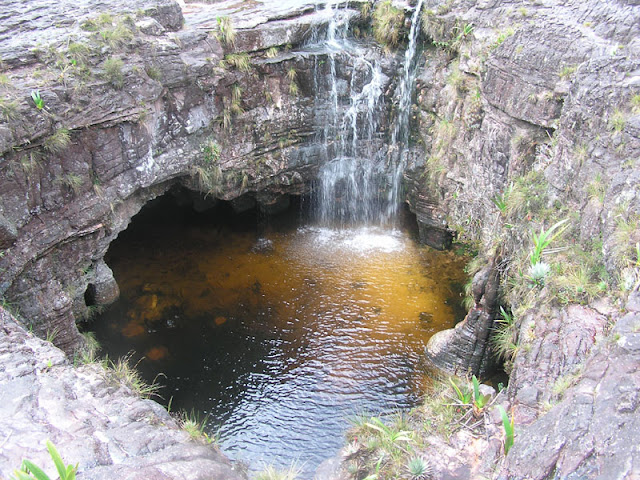Back to Erosion Landform
It is the source of the Kukenán River.
 |
| Autama tepui |
- A tepui is a table top mountain /mesa.
- Found in the Guiana Highlands,South America
Venezuela
- Tepui means "house of the gods".
- Found as isolated entities.
- Unique array of endemic plant & animal species live there.
- Most outstanding tepuis are;
Neblina
Autana
Auyantepui
Mount Roraima
- They are composed of sheer blocks of Precambrian quartz arenite sandstone.
- That rise from the jungle.
- It gives spectacular natural scenery.
- Auyantepui is the source of Angel Falls, the world's tallest waterfall.
 |
| Kukenan tepui |
- These are the remains large sandstone plateau.
- That covered the granite basement.
- Range in elevation from 1,000 - 3,000 m.
- The Gran Sabana is the highest tepuis.
- On top of the mountains grow;
various types of forests.
wide variety of orchid
bromeliad
carnivorous plant
 |
| tepui mountins venzuela |
- Tepuis exhibit surface features & subsurface caves.
- Karst topography formed in more water-soluble rocks.
- Caves include the Abismo Guy Collet. (671m deep )
- The deepest quartzite cave in the world.
- The mesas are pocked with giant sinkholes up to 300 m.
- These sinkholes are formed the roofs of tunnels carved by underground rivers collapse.
 |
| Sinkhole |
- The tepuis known as islands above the rainforest.
- A few of mountains are cloaked by thick clouds almost the whole year.
- Notable tepuis
- Auyantepui
Surface area of 700 km².
Angel Falls drops from a cleft in the summit.
- Mount Roraima
- Matawi Tepui
It is the source of the Kukenán River.
Considered the "place of the dead".
Located next to Mount Roraima in Venezuela.
- Autana Tepui
A unique cave runs from one side of the mountain to the other.
- Ptari Tepui's
High number of endemic plant & animal species found there.
- Sarisariñama Tepui
Which go straight down from the mountain top.
The largest sinkhole is 350 m in diameter.
They harbor an ecosystem composed.
Unique plant & animal species lives at the bottom .
- Endemic fauna & flora represent of ancient species was an inspiration to the novel The Lost World by Arthur Conan Doyle.
- Much of the story of Pixar--Disney 2009 film Up takes place among the tepuis.
- The film includes numerous rock formations & an Angel Falls-like waterfall called "Paradise Falls".
 |
| venezuela tepui |
 |
| The steep rock wall of Mount Roraima. |


Hi,
ReplyDeleteI am a geologist publishing a chapter in a geomorphology volume on intracontinental mountains and erosional uplands and am wondering if I could use your Kukenan tepui image in my chapter. Do you hold the copyright and if so, could I use your photo and cite you as its source? Please advise. Thanks,
Dickson Cunningham
Professor of Geology
Eastern CT State University, USA